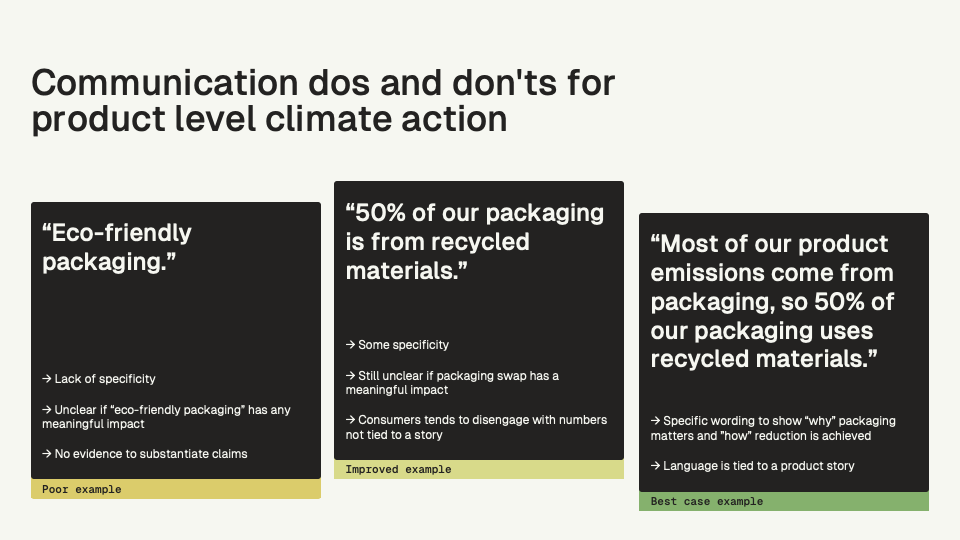Green Claims Directive
Update November 2025: The Green Claims Directive is on hold, and the next steps are unknown.
What is the EU Green Claims Directive?
Through the proposed Green Claims Directive, the EU will provide regulations on environmental claims made by companies. Their goal is to prevent greenwashing claims and ensure consumers receive transparency about the environmental impact of consumer products.
Green Claims Directive proposal
The European Commission proposed the directive after a 2020 consumer study found that “53.3% of the claims examined were vague, misleading or unfounded, and 40% were completely unsubstantiated.”
The directive would target “green claims made by businesses that state or imply a positive environmental impact” and require them to be substantiated.
For instance, it isn’t incorrect to claim to have "packaging made of 30% recycled plastic", but it must be verified and transparent.
EU Green Claims Directive status
The EU adopted the draft directive in March 2024, then paused the process as it was finalising negotiations in June 2025. The directive is back in the review stage with no new timeline. However, environmental advertising will be regulated by another European Green Deal directive – Empowering consumers for the green transition (EmpCo Directive) – that was published in March 2024.
The EmpCo Directive
Whereas the Green Claims Directive focuses on scientific substantiation and third-party verification, EmpCo targets B2C communication and strengthens consumer protection. If the two directives passed together, the Green Claims would have been lex specialis compared to EmpCo.
EU member states must transpose EmpCo into national law by March 2026, then it becomes binding from September 2026. In Germany, for instance, the rules will be implemented in the UWG (Gesetz gegen den unlauteren Wettbewerb, or Act against Unfair Competition).
Greenwashing and greenhushing concerns
Greenwashing refers to misleading environmental claims, which is explicitly addressed by both the Green Claims and EmpCo directives.
On the other hand, greenhushing is the opposite: companies stop communicating their sustainability efforts because of perceived reputational risk.
A recent report concluded that both greenwashing and greenhushing hurt brand value and bottom-line value.
Instead of underreporting sustainability efforts, they key is making verifiable and transparent environmental claims that can be backed up.

Verifiable environmental claims
Making claims like "packaging made of 30% recycled plastic" will not be banned, but rather need to be verified through supplier certifications, sourcing documents, etc.
Therefore, it’s important to have a claim backed by scientific evidence, not misleading, clear, unambiguous, and transparent.
For instance, the ClimatePartner certified label provides verifiable climate action communication through its focus on transparency and credibility. To receive this label, companies calculate their emissions, set reduction targets, and support climate projects, resulting in a unique climate-ID page and communication guidance.
With over 20 years of experience and thousands of customers, ClimatePartner knows and dos and don’ts of climate action communication.
Green Claims Directive FAQ
When will the Green Claims Directive be implemented?
Because the directive was paused June 2025, its planned future implementation of 2027 is unlikely.
What is green policy?
Green policy refers to regulations and guidelines set to reduce the negative impact of companies, government, etc. on the environment. For instance, the European Green Deal, under which the Green Claims Directive is included, aims for European to become “carbon-neutral” by 2050 via binding commitments.
Is the Green Claims Directive still on the EU’s legislative train?
The legislative process is suspended but not formally terminated. The European Commission announced its intention to withdraw the proposal in June 2025, and the Council Presidency cancelled the scheduled trilogue. However, the Parliament remains open to resuming negotiations, and the formal status remains unclear.